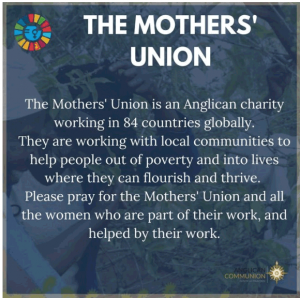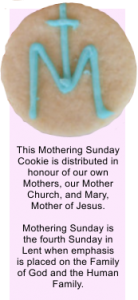Who is the Mothers’ Union?
Mothers’ Union has over 4 million members world-wide spread across 84 countries. Members work together to solve challenges in their local communities. By helping to restore and strengthen relationships in families and communities, Mothers’ Union gives a sense of belonging and acceptance to the stigmatized and vulnerable. Visit the worldwide Mothers' Union website.
- Strengthen communities all over the world
- Help the most disadvantaged at home
- Shape how we advocate for the rights of families
- Build supportive, loving relationships
- Develop a relationship with God
Globally, Mothers’ Union focuses its efforts on
- Creating a peaceful and safe environment for all,
- Fighting for gender justice, and
- Building individuals’ self-reliance.
Locally, branches are at the very heart of all that Mothers' Union does, coming together to work and pray in fellowship.
View / download the Canadian Mothers' Union information brochure
Mothering Sunday
Social togetherness is more important now than it ever was. Traditional festival days and related celebrative events in the calendar bring people together and strengthen communities. Mothering Sunday has come a long way from its origins but remains a means of fostering closeness.
Mothering Sunday, not to be confused with Canadian Mother's Day, is celebrated in Anglican Churches on the fourth Sunday in Lent.
Mothering Sunday customarily celebrated on the Fourth Sunday in Lent
It is a very old liturgical feast known by several names over the ages: Laetare Sunday to honour the Virgin Mary, Refreshment Sunday, Rose Sunday and Mothering Sunday. It dates back to the custom in England when domestic servants in the grand houses of the landed gentry were permitted to go home to visit their home church and mother. Often the housekeeper or cook would allow the maids to bake a cake to take home to their mother. Sometimes a gift of eggs or flowers from the garden (or hothouse) was allowed, or they may have picked wildflowers from the wayside, violets especially.
In Canada, Mothers' Union branches sometimes observe Mothering Sunday by distributing flowers to mothers and serving the traditional Simnel cake and/or cookies after the church service. Simnel cake is a light fruit cake made with a layer of marzipan in the middle and if desired a layer on top. The cake is decorated with 11 marzipan balls representing the 12 apostles minus Judas, the betrayer of Christ. If 12 balls are used, the 12th one is to represent Jesus.
Recipe for Simnel Cake

3/4 cup sugar
4 eggs
1/2 tsp almond extract
2 cups raisins
1 cup currants
1/2 cup mixed peel
1/3 cup chopped candied cherries
2 tsp lemon rind
2 cups flour
1 tsp baking powder
1/2 tsp salt
500 grams of almond paste, at room temperature
Directions:
Cream butter and sugar. Add eggs 1 at a time. Add almond extract. Sift together the flour, baking powder and salt. Add to eggs, then add the fruit and mix.
Put 1/2 the mixture in an 8” springform pan lined with waxed or parchment paper. Roll half of almond paste and place in pan. Spoon remainder of batter on top. Bake 30 min at 350°F then reduce heat to 300°F and bake 1 1/2 hours longer. Cool 10 min. Heat oven to 425°F.
Roll remaining almond paste into an 8” round circle and 12 small balls.
Put the circle on top of the cake and place the balls on top like the numbers on a clock.
Bake for 8 min watching closely so the balls do not flatten too much or burn.




